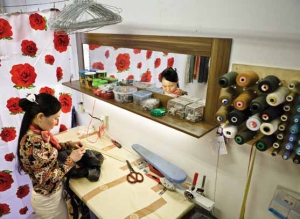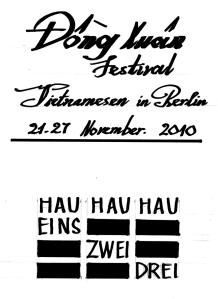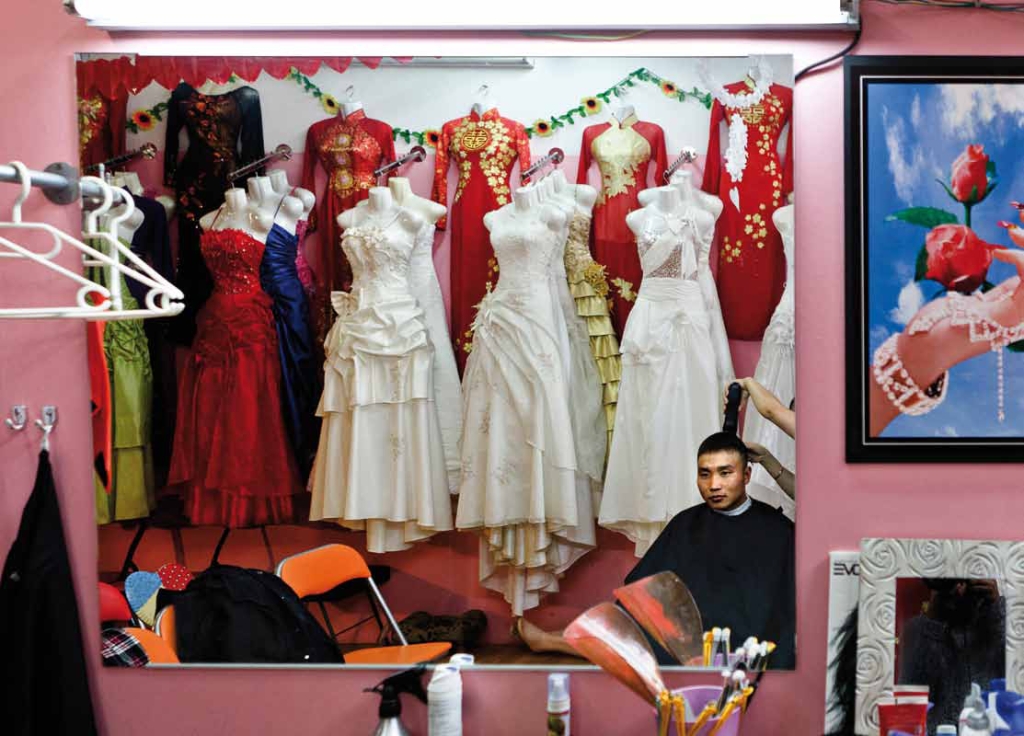Xin vui lòng xem bản tiếng Việt bên dưới. Scroll down for the Vietnamese language version.
This looks like it will be a terrific show. Check it out if you’re lucky enough to be in Berlin. We’ve adapted the press materials for this announcement.
—
Between 100,000 to 125,000 Vietnamese live in Germany, with some arriving in the 1960s and 1970s as refugees yet most coming later to the German Democratic Republic as guest workers. The Đồng Xuân – Vietnamesen in Berlin exhibit (November 21-27, 2010) focuses upon the artworks of the Vietnamese German community, while showcasing films and other works of art from within the larger Vietnamese diaspora.
Đồng Xuân – Vietnamesen in Berlin
Vietnamese Diaspora and Beyond
Hebbel Theater am Ufer Berlin
HAU 2
Hallesches Ufer 32
10963 Berlin, Germany
26.11. – 27.11.2010
While the dominant debates on integration are still characterised nationally and culturally, often not exceeding racist platitudes, there is in social reality a fundamental change in society. With the example of Vietnamese migration that is strongly present in Berlin one can show how life in diaspora takes on various forms, and how this process has to be thought of from the perspective of the migrant subjects. With this change of perspective comes along a shifting from the habitual pattern of perception and the content that goes hand in hand. In thinking newly about the nation from its far corners it becomes possible to evoke questions that have been neglected so far, and to focus on marginalised spaces.
 Part of this revision is to not only test essentialist constructs of identity and
Part of this revision is to not only test essentialist constructs of identity and
the homogenizing understanding of culture, but also to lead the term of “diaspora” towards a contemporary meaning. Migration is no longer being perceived as a problem that has to be solved, but the diaspora is being discussed as a cosmopolitical form of transformation into public ownership, linking Berlin to Vietnam, Orange County (U.S.A.) and other diasporic places. Being at home in-between hybrid cultures, political borderlines and constructed nations, enabling transnational solidarity and provoking claims for a “cultural citizenship” – this all represents the actual task for the future of the migration society.
 Such complex, composite identities in diasporic communities reflect diverse historical experiences with exile, gender-specific exploitation and racism. On the one hand they are being processed culturally, and on the other they contain a socio-political dimension. However it is by no means about deficit-compensations and integration efforts, but about the same rights and democratic standards. At the same time these universal categories indicate the necessity not to stumble into the “ethno-trap”, but to open up the discussion about anti-Asian racialisation and exotisms for other experiences, and to look for trans-boundary forms of solidarity.
Such complex, composite identities in diasporic communities reflect diverse historical experiences with exile, gender-specific exploitation and racism. On the one hand they are being processed culturally, and on the other they contain a socio-political dimension. However it is by no means about deficit-compensations and integration efforts, but about the same rights and democratic standards. At the same time these universal categories indicate the necessity not to stumble into the “ethno-trap”, but to open up the discussion about anti-Asian racialisation and exotisms for other experiences, and to look for trans-boundary forms of solidarity.
~ Kien Nghi Ha
With Trinh T. Minh-ha, Anna Babka, Nguyễn Quốc Toản, Sun-Ju Choi, Urmila Goel, Jee-Un Kim, Nivedita Prasad, Kien Nghi Ha, Ruth Mayer, Iman Attia, Uta Beth, Pham Thi Hoai, Anja Tuckermann, Petra Isabel Schlagenhauf, Tamara Hentschel, Thúy Nonnemann, Günter Piening, Alke Wierth.
Đồng Xuân – Vietnamesen in Berlin
Người Việt hải ngoại và hơn thế nữa
Hebbel Theater am Ufer Berlin
HAU 2
Hallesches Ufer 32
10963 Berlin, Đức
26.11. – 27.11.2010
Trong lúc các cuộc tranh luận chính về hội nhập vẫn mang đậm dấu ấn văn hóa quốc gia và thường không tránh được lối mòn chủng tộc, trong thực tế xã hội đang diễn ra một sự thay đổi căn bản. Người Việt nhập cư, một cộng đồng lớn ở Berlin, là ví dụ cho thấy rằng cuộc sống hải ngoại mang nhiều hình thức đa dạng, và quá trình này cần được tiếp cận từ góc độ của người nhập cư. Sự thay đổi trong cách nhìn này dẫn đến sự thay đổi trong mô hình nhận thức quen thuộc và những nội dung đi kèm với nó. Tiếp cận khái niệm dân tộc từ ngoại biên giúp phơi bày ra ánh sáng những câu hỏi từ trước đến nay bị sao nhãng và đặt lại những vấn đề bị đẩy ra ngoài lề vào trung tâm.
Trong khuôn khổ này di cư không còn được hiểu là một vấn đề phải giải quyết nữa mà cần được thảo luận như một hình thức xã hội hóa quốc tế nối Berlin với Việt Nam, quận Cam (Mỹ) và các địa điểm nhập cư khác. Nhiệm vụ thiết thực của xã hội nhập cư trong tương lai là một định nghĩa “quê hương” có khả năng vượt qua các biên giới văn hóa, chính trị và dân tộc để tiến tới sự đoàn kết xuyên quốc gia và mang lại nội dung cụ thể cho khái niệm “công dân của một nền văn hóa”. Thay cho những đền bù thiếu hụt và thành tích hội nhập có tính chất nghĩa vụ, quyền bình đẳng và dân chủ phải là trọng tâm của các cuộc thảo luận.
Chương trình
Thuyết trình: Twilight Walk: The Time of Metamorphoses
Thuyết trình: „Qua cầu gió bay“. Kinh nghiệm nghe nhìn về trốn chạy, tha hương và di cư
Thảo luận: Quá trình tự tổ chức và Căn cước của Châu Á Thái Bình Dương
Thuyết trình: Á Châu Hải Ngoại: Khái niệm, Lịch sử, Tranh Luận
Thảo luận: „Quê hương là nơi mọi người hiểu ta“. Cộng đồng người Đức gốc Việt, thế hệ thứ hai và những trải nghiệm nhập cư khác nhau.
Thảo luận: Một tranh luận hội nhập mang tính chất khác – Từ mafia thuốc lá ngoài vòng pháp luật đến học sinh kiểu mẫu?
Với Trinh T. Minh-ha, Anna Babka, Nguyễn Quốc Toản, Sun-Ju Choi, Urmila Goel, Jee-Un Kim, Nivedita Prasad, Kien Nghi Ha, Ruth Mayer, Iman Attia, Uta Beth, Pham Thi Hoai, Anja Tuckermann, Petra Isabel Schlagenhauf, Tamara Hentschel, Thúy Nonnemann, Günter Piening, Alke Wierth.
~
Did you like this post? Then please take the time to rate it (above) and share it (below). Ratings for top posts are listed on the sidebar. Sharing (on email, Facebook, etc.) helps spread the word about diaCRITICS. Thanks!






